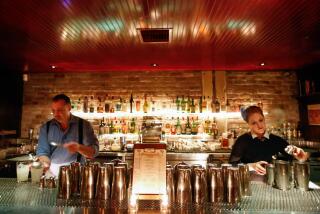Early on, head of Karl Strauss Brewing Co. had a taste for craft beers
The gig: Chris Cramer, 53, is chief executive and co-founder of Karl Strauss Brewing Co. Started in 1989, it is one of the oldest craft breweries in Southern California and a pioneer in San Diego’s renowned craft beer industry.
Baccalaureate bartender: Cramer, a fourth-generation San Diegan, got his start in the beverage business when he took a bartending class while attending Stanford University as an undergraduate in the early 1980s. He leveraged those skills into a business that handled the bars for university events that drew visitors from around the world. Stocking the supply for guests’ specific tastes, he developed an appreciation for a wide variety of regional beers, wines and liquors.
Flavor Down Under: It wasn’t until after earning his MBA from Stanford, during a post-graduation trip around the world in 1985, that Cramer discovered “a glass of beer that changed my life.” He found it at an Australian pub — a bitter, copper-colored ale that was unlike anything he had ever tasted. When Cramer asked where it came from, the bartender took him around the side of the building to a microbrewery that produced most of the pub’s selections.
Blasé beer: He couldn’t shake the idea of beers with rich flavor, produced locally. But San Diego’s beer scene was a world away from its present-day status, home to about 100 microbreweries and rated as America’s top beer town by Men’s Journal in 2009. “There was no culture at all in San Diego for craft beer,” Cramer said. “It was a Coors Light, Miller Lite town.”
The namesake: Cramer had a secret weapon. A distant cousin he affectionately called “Uncle Karl” happened to be one of the most renowned brewers in the U.S. Karl Strauss grew up in a brewing family in Germany and trained at the world-renowned Weihenstephan brewing school in the 1930s. He saw the rise of the Nazis and left for New York in 1939. He visited friends in Milwaukee, where there was an opening at the local brewery, known as Pabst. Strauss stayed at Pabst for 44 years, rising to vice president and master brewer.
Hatching a plan: Cramer cornered Strauss with the microbrewing proposition. He recalled his answer (in a German accent): “You know, Chris, I think it’ll be the wave of the future.” With Strauss’ brewing expertise, Cramer brought on Matt Rattner, a friend from graduate school who crafted their first business plan as part of an entrepreneurship class.
Brewing a business: Officials in San Diego peppered them with questions: Could the brewery possibly explode in the middle of downtown? Would this new homemade style of beer be safe for public consumption? After talking with investors, the duo decided it would be impossible to start off selling beer in stores because of the difficulty competing with entrenched distributors such as Budweiser and Coors. So they went with a restaurant and brewery — lure customers with food, then get them to try the beer. “The idea was to hopefully create converts to the style, and then send them back out into the world as raving fans,” Cramer said.
Easing in: Compared to the ultra-hoppy “West Coast” India Pale Ale varieties that have distinguished San Diego’s beer, Karl Strauss Brewing’s initial offerings were tame. On opening day, they featured an amber lager, a golden ale and a dark brown ale. “We had to work them down the flavor path to more and more extraordinary beers,” Cramer said. Within months they started to run out of beer, as restaurants, bars and hotels wanted to feature the new local brews on tap. By 1991, the company had built a separate distributing brewery and started selling beer more widely. By testing small batches in the restaurants, the company could gauge popularity and scale up production accordingly. Today Karl Strauss Brewing has eight brew pub locations in Southern California, with plans to add a second distributing brewery.
An industry is born: Through brew master Strauss’ mentorship (he died in 2006), the company spawned entrepreneurs and brewers who have become the foundation of San Diego’s beer culture. Tour guide Jack White went on to start Ballast Point Brewing Co.; Gina Marsaglia, one of the original servers, founded the Pizza Port Brewing Co. chain; and brewer Chuck Silva went on to become the brew master for Green Flash Brewing Co. “The DNA of our company just runs throughout the industry,” Cramer said.
Fresh tastes: Cramer travels the world in search of new flavors. He just returned from a trip to Australia and Tasmania, where farmers grow rare hops that Cramer wants to feature. Though the company has the 45th-largest volume of craft beer distribution in the country — out of more than 3,000 such breweries — Karl Strauss is available only in the Golden State. “A lot of breweries go for a wide distribution,” Cramer said. “We have a little bit of a different plan. We want to go an inch wide and a mile deep.”
Twitter: @c_kirkham
More to Read
Inside the business of entertainment
The Wide Shot brings you news, analysis and insights on everything from streaming wars to production — and what it all means for the future.
You may occasionally receive promotional content from the Los Angeles Times.










